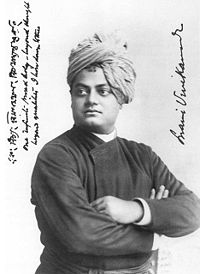5. प्रवणत्तबृदे ेप्रमोजकंणचत्तभ एकभ् अन्केेषाभ ॥् ५॥
pravṛtti-bhede prayojakaṁ cittam-ekam-anekeṣām ||5||
Though the activities of the different created minds are various, the one original mind is the controller of them all.
These different minds, which will act in these different bodies, are called made-minds, and the bodies made-bodies; that is, manufactured bodies and minds. Matter and mind are like two inexhaustible storehouses. When you have become a Yogi you have learned the secret of their control. It was yours all the time, but you had forgotten it. When you become a Yogi you recollect it. Then you can do anything with it, manipulate it any way you like. The material out of which that manufactured mind is created is the very same material which is used as the macrocosm. It is not that mind is one thing and matter another, but they are different existences of the same thing. Asmita, egoism, is the material, the fine state of existence out of which these made-minds and made-bodies of the Yogi will be manufactured. Therefore, when the Yogi has found the secret of these energies of nautre he can manufacture any number of bodies, or minds, but they will all be manufactures out of the substance known as egoism.
6. तत्र ध्यानजभ अनाशमभ् ॥् ६॥
tatra dhyānajam-anāśayam ||6||
Among the various Chittas that which is attained by Samadhi is desireless.
Among all the various minds that we see in various men, only that mind which has attained to Samadhi, perfect concentration, is the highest. A man who has attained certain powers through medicines, or through words, or through mortifications, still has desires, but that man who has attained to Samadhi through concentration is alone free from all desires.
7. कभाशयिाकुृष्णंमोणगन् णत्रणवधभ इतय्षाभे ॥् ७॥
karma-aśukla-akṛṣṇaṁ yoginaḥ trividham-itareṣām ||7||
Works are neither black nor white for the Yogis; for others they are threefold, black, white, and mixed.
When the Yogi has attained to that state of perfection, the actions of that man, and the Karma produced by those actions, will not bind him, because he did not desire them. He just works on: he works to do good, and he does good, but does not care for the result, and it will not come to him. But for ordinary men, who have not attained to that highest state, works are of three kind, black (evil actions), white (good actions), and mixed.
8. ततस्तणिऩाकानगुिानाभु एवाणबव्यणिवा्सनानाभय ॥् ८॥
karma-aśukla-akṛṣṇaṁ yoginaḥ trividham-itareṣām ||7||
From these threefold works are manifested in each state only those desires (which are) fitting to that state alone. (The others are held in abeyance for the time being.)
Suppose I have made the three kinds of Karma, good, bad, and mixed; and suppose I die and become a god in heaven; the desires in a god body are not the same as the desires in a human body. The god body neither eats nor drinks; what becomes of my past unworked Karmas, which produce as their effect the desire to eat and drink? Where would these Karmas go when I became a god? The answer is that desires can only manifest themselves in proper environments. Only those desires will come out for which the environment is fitted; the rest will remain stored up. In this life we have many godly desires, many human desires, many animal desires. If I take a god body, only the god desires will come up, because for them the environments are suitable. And if I take an animal body, only the animal desires will come up, and the god desires will wait. What does that show? That by means of environment we can check these desires. Only that Karma which is suited to and fitted for the environments will come out. These proves that the power of environment is the great check to control even Karma itself.
9. जाणतदशकारव्यवणहतानाभे अप्यानन्तम्ं, स्मणतसंस्कायमो्ृ एकूऩत्वात ॥् ९॥
jāti deśa kāla vyavahitānām-apy-āntaryāṁ smṛti-saṁskārayoḥ ekarūpatvāt ||9||
There is connectiveness in desire, even though separated by speices, space and time, there being identifi-cation of memory and impressions.
Experiences becoming fine become impressions; impressions revivified become memory. The word memory here includes unconscious co-ordination of past experience, reduced to impressions, with present conscious action. In each body the group of impressions acquired in a similar body only will become the cause of action in that body. The experiences of dissimilar bodies will be held in abeyance. Each body will act as if it were a descendant of a series of bodies of that species only; thus, consecutiveness of desires will not be broken.
 Swami Vivekananda
Swami Vivekananda
